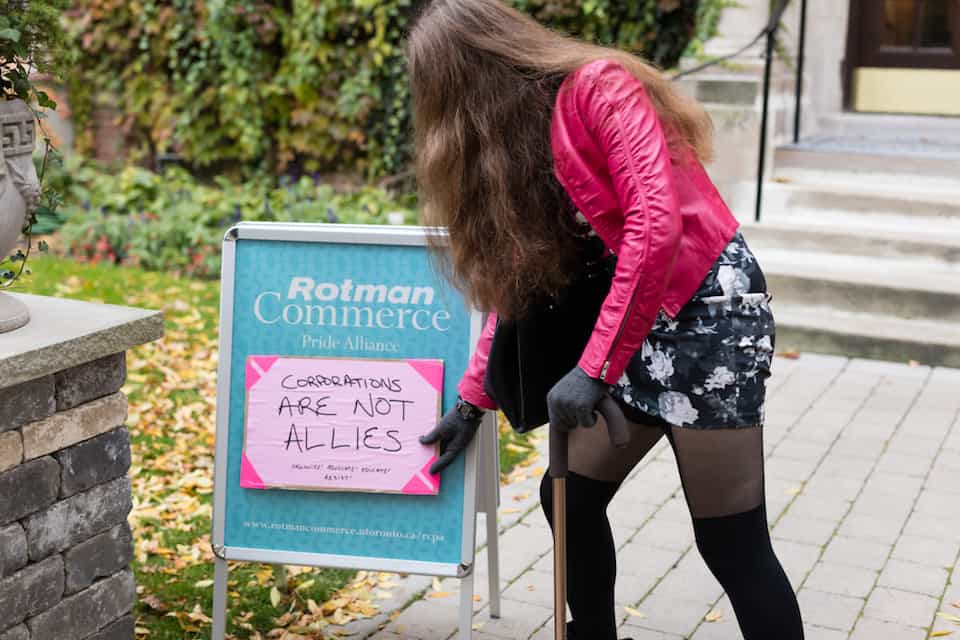The Trans Inclusivity Project (TIP) is a new club at the University of Toronto founded to address the systemic inequality experienced by transgender students trying to access education, as well as the violence experienced by transgender people in Toronto.
“Even organizations and faculty within U of T have a history of perpetuating transphobia and transmisogyny, both through intentional and unintentional means. Simply put, this history is an unjust one, and it urgently needs to be addressed with accountability, and sweeping changes,” said Jades Swadron, an organizer with TIP.
A unique group
Although TIP is a student group recognized by both ULife and the University of Toronto Students’ Union, its services are also available to the greater Toronto trans community. “While TIP also serves to act as a student advocacy group in the case of students experiencing transmisogyny or transphobia, but with such a large school, it should also come as no surprise that it plays a role in the lives of people who are not students or faculty,” said Swadron.
“Being able to provide outreach for trans people who are not students, and also letting trans students interact with them and grow off their experiences, is definitely an invaluable experience for both parties involved.”
A unique aspect of the group is that rejects a hierarchical structure, preferring a horizontal structure instead. “Due to the ways in which trans people have had to endure marginalization so consistently, it is in our experience that only the most privileged trans people seem to get into positions of power, even within our own communities,” explained Swadron.
“[Every] time a trans person seems to be able to succeed, they are leaving everyone else around them behind. Our successes are all too often tokenistic, and rather than bringing up the community, they just seem to separate us… With the marginalization that trans people face, a few people getting a chance for success is absolutely insufficient for changing the overall status of trans people,” she said.
Protest against RCPA event
TIP recently held its first events — a meeting, and a protest against a panel discussion held by the Rotman Commerce Pride Alliance (RCPA), both of which Swadron feels were successful.
The protest occurred on Wednesday, October 21, outside the U of T Faculty Club, where the RCPA-hosted panel discussion took place. The panel discussion, entitled ‘The Business Case’, was designed to create discussion around how LGBTQ+ inclusion throughout the workplace drives acceptance and authenticity.
“As LGBTQ+ and ally business students, one of our aims is to help build a safe and inclusive space for LGBTQ+ individuals in the corporate sphere and to further the dialogue around the important issue of diversity in the workplace,” said Christopher Morello, president of the RCPA.
Morello added that through the discussion, the RCPA sought to address some of the historical and systematic marginalization of LGBTQ+ people in business by connecting students interested in finance, consulting, accounting, and legal careers with special networking opportunities to reduce barriers into the workforce.
However, TIP saw cause to boycott the event, citing the cost of the panel discussion, sponsorship concerns, and co-opting of the term ‘intersectionality’ as reasons for the boycott. “The way in which the Rotman Commerce Pride Alliance positions diversity and inclusion as not having inherent value beyond their ability to increase profits, renders it a matter of tokenization and superficial marketing schemes, and affirms our standing that corporations will forever place us in the margins,” read part of a post in the boycott’s Facebook event.
“One of the core mandates of the RCPA is to support the visibility and acceptance of trans people in business,” said Morello in response to the boycott. “All RCPA members actively engage in trans inclusion workshops with the University of Toronto’s Sexual Gender and Diversity Office, the 519 Church Street Community Centre, and the Miami-based YES Institute. Since our founding, the RCPA has welcomed numerous trans students and professionals to our events in a truly safe environment,” he added.
While Swadron acknowledged that the RCPA’s event was not without merit, they objected primarily to the involvement of large corporations in the event’s funding. “[As] an event aimed at LGBT people, the RCPA’s event was already trying to do something right. However, the way the event was very much wrapped up with corrupt corporations, and depicted business as an unrealistic saviour to queer people. These sorts of things made protesting the event a very much prudent thing to do,” Swadron said.
Morello told The Varsity that the RCPA tried to meet with TIP organizers in advance of the panel discussion and protest, but that attempts were unsuccessful. “We appreciate the value of diverging viewpoints within our community and extend an invitation to anyone interested to engage in dialogue to drive equality forward,” Morello said.
TIP plans to host a workshop on Wednesday, October 28, explaining their call to boycott the RCPA event. “The reception we have received has been both [despair-inducing], in the sense that there are still bigots around campus, but also heartwarming, due to the positive impact we have been able to make already, just in TIP’s first semester of existence,” Swadron said.


